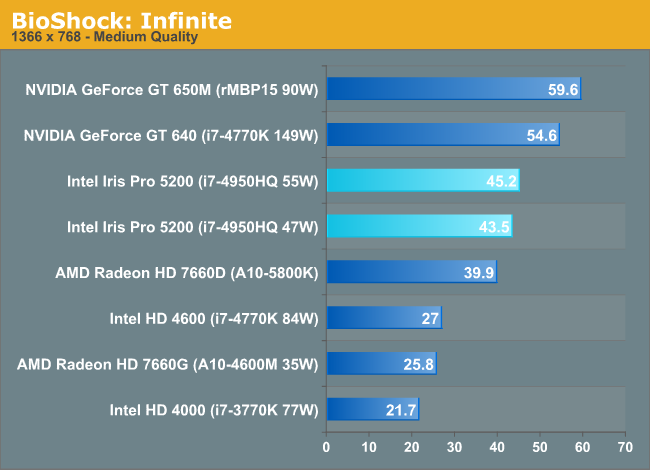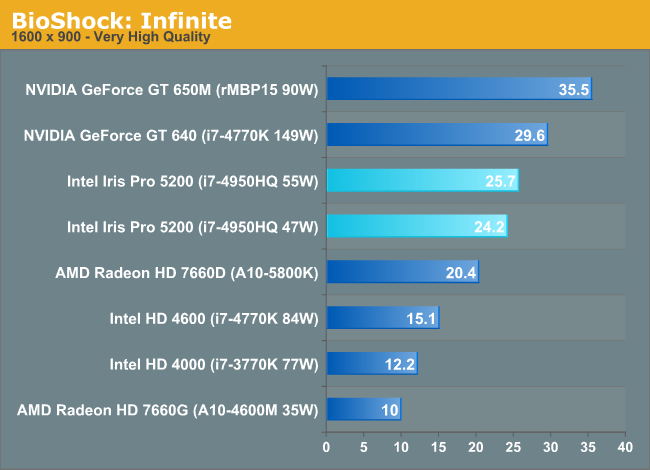Intel Iris Pro 5200 Graphics Review: Core i7-4950HQ Tested
by Anand Lal Shimpi on June 1, 2013 10:01 AM ESTBioShock: Infinite
Bioshock Infinite is Irrational Games’ latest entry in the Bioshock franchise. Though it’s based on Unreal Engine 3 – making it our obligatory UE3 game – Irrational had added a number of effects that make the game rather GPU-intensive on its highest settings. As an added bonus it includes a built-in benchmark composed of several scenes, a rarity for UE3 engine games, so we can easily get a good representation of what Bioshock’s performance is like.

Both the 650M and desktop GT 640 are able to outperform Iris Pro here. Compared to the 55W configuration, the 650M is 32% faster. There's not a huge difference in performance between the GT 640 and 650M, indicating that the performance advantage here isn't due to memory bandwidth but something fundamental to the GPU architecture.
In the grand scheme of things, Iris Pro does extremely well. There isn't an integrated GPU that can touch it. Only the 100W desktop Trinity approaches Iris Pro performance but at more than 2x the TDP.

The standings don't really change at the higher resolution/quality settings, but we do see some of the benefits of Crystalwell appear. A 9% advantage over the 100W desktop Trinity part grows to 18% as memory bandwidth demands increase. Compared to the desktop HD 4000 we're seeing more than 2x the performance, which means in mobile that number will likely grow even further. The mobile Trinity comparison is a shut out as well.










177 Comments
View All Comments
Old_Fogie_Late_Bloomer - Monday, June 3, 2013 - link
The performance isn't earth-shattering, but if Intel manages to put out good open-source Linux drivers for Iris Pro, I can't help but feel like this would be a great chip for that; it isn't like you'll be playing Crysis in Ubuntu anytime soon. I kind of want that CRB (or something like it), actually.tviceman - Saturday, June 1, 2013 - link
I'll bet notebooks with mid-range quad core CPU's and gt 750m discrete graphics will be cheaper than notebooks with Iris Pro enabled iGPU graphics as well. The only benefit would be a slightly slimmer chassis and battery life. Anyone who still wants to game on a notebook is noticeably better off with a mid-range discrete GPU over this.esterhasz - Saturday, June 1, 2013 - link
On page four, the ominous launch partner is not "keen" rather than "key", I guess. I'd be very keen on having that rMBP 13" with IP5200, though.Ryan Smith - Saturday, June 1, 2013 - link
Noted and fixed. Thank you.tipoo - Saturday, June 1, 2013 - link
I'm very much in that boat too, a quad core 13" rMBP with Iris Pro would put it over the top.MattVincent - Wednesday, June 12, 2013 - link
totally agree. I wonder if apple will actually put a quad core in the 13" though. I bet they would rather sell more 15" rmbp'sjeffkibuule - Saturday, June 1, 2013 - link
Would a 47W chip be able to fit into a normal 13" Ultrabook-like chassis like the 13" MacBook Pro with Retina Display? Only an extra 12W TDP to deal with.esterhasz - Saturday, June 1, 2013 - link
This would be awesome and we have to remember that the 47W TDP includes voltage regulation moving off the MB, so the gap is maybe only 8W. The 47 TDP also refers to both CPU and GPU running at full speed, which is an extremely rare scenario - in gaming, the CPU load will probably hover at 50% only.In any case, if the tested model goes into a rMBP 13" I'm going to buy it before Tim Cook has left the stage.
nofumble62 - Saturday, June 1, 2013 - link
Thinking to buy a Ivybridge Mac Book Pro for my wife, I guess she will have wait a little longer for this baby. I wish they could fit in a Mac Book Air.jeffkibuule - Saturday, June 1, 2013 - link
Look at the price of those chips though, you're going to be dropping at least $2000 on such a laptop when the CPU alone is $478.